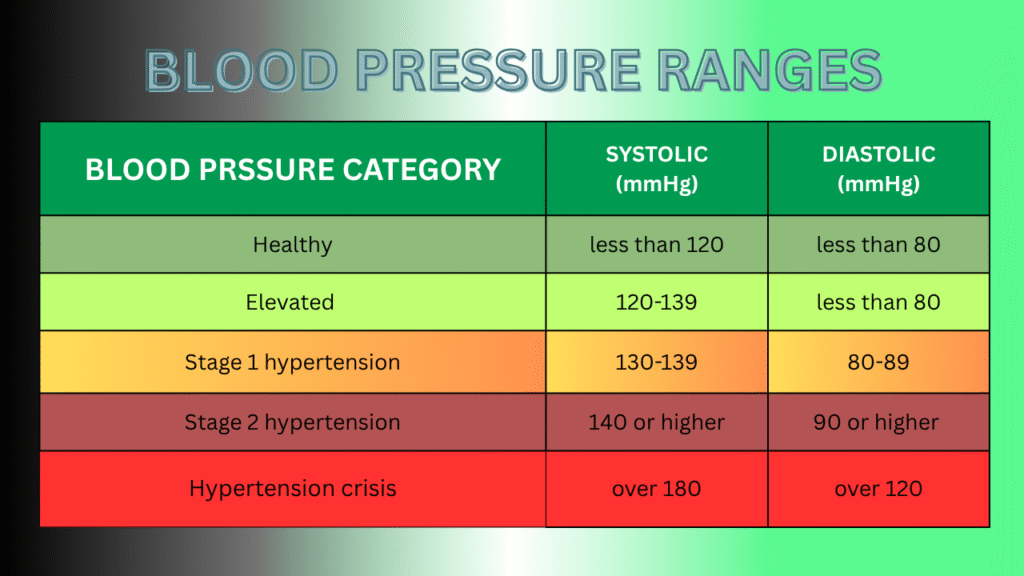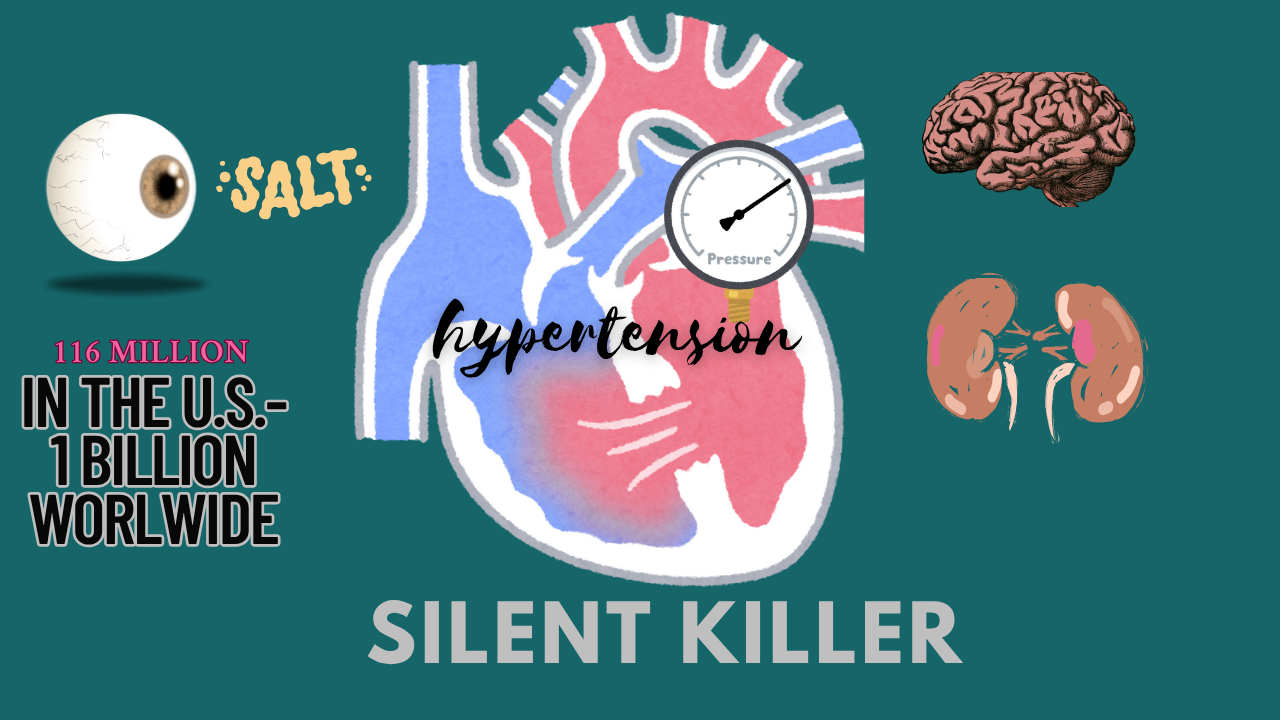Table of Contents
Hypertension
Hypertension is a very common disease, and in today’s time, it has become extremely dangerous. The scary part is that most people don’t even realize they are suffering from it. Approximately 116 million adults in the U.S. and more than 1 billion adults worldwide are affected by hypertension, yet many of them are unaware of their condition. It is responsible for nearly 6% of deaths worldwide. Because of this, hypertension is sometimes referred to as the “silent killer.”
This is because, in most cases, the cause of hypertension remains unidentified (also known as essential or primary hypertension).
In people with high blood pressure, the heart has to work harder than normal, which not only affects the heart but also puts strain on other vital organs like the kidneys, eyes, and brain.
Systolic and diastolic blood pressure should be 120 and 80 mmHg, respectively, as the standard values
If it continuously exceeds this range, it becomes hypertensive. The blood pressure varies with many factors, such as the age of the patient, emotional disturbances like fear or anxiety, exercise, and medical conditions. The rise in systolic pressure of even 10 mmHg may significantly raise the risk of heart disease and stroke.
It is recommended to measure blood pressure at least twice under the least stressful conditions to get an accurate reading.
Types
1. Primary or essential hypertension
In this type of hypertension, the causes of increased blood pressure are not known. Approximately 80–95% of patients with hypertension suffer essential hypertension.
2. Secondary hypertension
The increased blood pressure is caused by diseases such as kidney disease, endocrine disease(hormonal disorder), or some other organ-related disease. Secondary hypertension consists of the remaining 5-20% cases of hypertension.
Stages of Hypertension
It is basically divided into two stages-
1. Stage 1 –
When your systolic blood pressure is between 130 and 139 mmHg and your diastolic blood pressure is between 80 and 89 mmHg, you are said to suffer from stage 1 hypertension.
2. Stage 2 –
It represents when your systolic blood pressure is >140mmHg, and your diastolic blood pressure is >90mmHg

Sypmtoms
Most people who suffer from hypertension, or high blood pressure, do not feel any symptoms. However, in cases where the blood pressure becomes extremely high, symptoms like chest pain, headaches, and blurred vision may appear.
In such situations, checking your blood pressure is the best way to find out if you have high blood pressure or not.
This is important because if high blood pressure is not treated in time, it can lead to several serious health problems.
People with very high blood pressure (usually 180/120 mmHg or above) may experience symptoms such as:
- Nausea and vomiting
- Severe headaches
- Extreme dizziness
- Chest pain
- Restlessness or nervousness
- Anxiety
- Vision-related issues like blurred vision
- Confusion
- Irregular or abnormal heartbeat
If you experience any of these symptoms, it is recommended to check your blood pressure immediately. If it is high, seek medical attention without delay.
Treatment
By modifying our lifestyle, we can lower high blood pressure. Some important lifestyle changes include:
- Following a low-salt diet, because consuming too much salt can raise blood pressure. This happens because salt contains sodium, and when sodium levels increase, the body starts retaining water to balance it. This increases the blood volume, which leads to a rise in blood pressure.
- Losing excess weight, such as being overweight, is harmful. When there is more body fat, the body requires more blood supply to provide oxygen and nutrients to the fat cells. This causes the heart to work harder to pump more blood, which puts pressure on the blood vessels and raises blood pressure.
- Adding physical activity to your daily routine, because regular exercise strengthens the heart muscles. A healthy heart requires less effort to pump more blood. It also keeps blood vessels flexible, helps maintain a healthy weight, reduces stress hormones, and improves insulin sensitivity.
There are various health issues that affect your target blood pressure, like:
- CAD (Cardiovascular Disease) – which includes the risk of heart attacks and strokes
- Diabetes – a condition with high blood sugar levels
- CKD (Chronic Kidney Disease) – a condition in which the kidneys gradually lose their ability to filter waste and fluids from the blood. If you have any of these conditions, your target BP goal should be less than 130/80 mmHg.
Common Blood Pressure Medications:
- ACE Inhibitors – such as enalapril and lisinopril
These help relax blood vessels and protect the kidneys from damage. - Angiotensin-2 Receptor Blockers (ARBs) – such as telmisartan and losartan
These also relax blood vessels and offer kidney protection. - Calcium Channel Blockers –like felodipine and amlodipine.
This reduces blood pressure by relaxing and widening the blood vessels. - Diuretics (Water Pills) – include chlorthalidone and hydrochlorothiazide.
These remove excess water from the body, which reduces blood volume and helps lower blood pressure.
Causes
Modifiable Risk Factors (changeable factors):
- Unhealthy diet– such as excessive salt intake, a diet high in saturated and trans fats, and low consumption of fruits and vegetables
- Physical inactivity– lack of regular physical activity or exercise, and use of tobacco and alcohol
- Obesity or overweight- carrying too much weight
In addition, environmental factors also contribute to hypertension and related diseases, with air pollution being considered the most significant risk factor.
Non-Modifiable Risk Factors: Unchangeable risk factors
- Family history– having a family member with hypertension.
- Age over 65 years- Presence of co-existing conditions, such as diabetes or chronic kidney disease.
Prevention
To prevent high blood pressure, it is essential to make certain lifestyle changes. These changes not only help in controlling blood pressure but can also prevent its onset. However, in many cases, despite these efforts, individuals may still require medication.
What to Do:
- Incorporate regular physical activity into your daily routine, such as walking, jogging, running, swimming, dancing, or weightlifting.
- At least 150 minutes a week should be dedicated to moderate-intensity aerobic exercise, such as brisk walking, or vigorous physical activity, such as running.
- If you are overweight or obese, focus on reducing your body weight to a healthy level.
- You should eat more fruits and veggies each day.
- As instructed by your physician, take prescription drugs on time.
- Keep your visits with your healthcare practitioner on time.
What Not to Do:
- Avoid consuming excessive salt (limit intake to less than 2 grams per day).
- Abstain from foods that are heavy in saturated and trans fats. Instead, opt for healthy unsaturated fats.
- Limit alcohol consumption (maximum of 2 drinks per day for men, and 1 drink per day for women).
- Do not share your prescribed medication with others, and never skip a dose.
- Effectively managing hypertension can protect you from several serious health complications such as heart attack, stroke, and kidney damage.
Effective ways to reduce the risk
Monitor your blood pressure regularly.
Manage stress and try to stay calm and relaxed.
Strictly follow treatment plans for high blood pressure.
Minimize exposure to polluted air.
Manage other medical conditions alongside hypertension to maintain overall health.
By adopting these preventive measures, you can significantly reduce the risks associated with hypertension and improve your quality of life.
When to see a doctor
If you experience symptoms such as headache, dizziness, fatigue, or nosebleeds (though rare).
if your blood pressure measurements continuously stay higher than 140/90 mmHg.
If you have a family history of hypertension, it is advisable to monitor your BP regularly and consult a doctor if needed.
If your blood pressure remains uncontrolled despite taking prescribed medication.
If high BP is detected during pregnancy, it is important to consult a doctor immediately.
If you are already suffering from conditions like diabetes, heart disease, or kidney disease, even slightly elevated BP levels should be discussed with a doctor.
If you frequently feel stressed, sleep-deprived, or experience chest pain, do not delay consulting a healthcare professional.
Frequently Asked Questions (FAQ)
Q: What is Hypertension?
It is also known as high blood pressure, a condition where the force of blood against the artery walls is consistently too high. Over time, it can damage vital organs like the heart, kidneys, brain, and eyes.
Q: Why is Hypertension called the “Silent Killer”?
It’s called the “Silent Killer” because it usually has no obvious symptoms in its early stages, yet it quietly damages internal organs over time without the person realizing it
Q: What is considered normal blood pressure?
Normal blood pressure for a healthy adult is: Systolic (upper number): 120 mmHg, Diastolic (lower number): 80 mmHg. If your reading consistently exceeds 140/90 mmHg, it is considered hypertension
Q: What are the common causes of hypertension?
Poor diet (excess salt, processed foods), Stress and anxiety, Lack of physical activity, Smoking and alcohol use, being overweight or obese, and family history of high blood pressure.
Q: Is there a permanent cure for hypertension?
No. Hypertension cannot be completely cured, but it can be effectively managed and controlled with the right treatment and lifestyle changes.
Q: Can young people get hypertension?
Yes. Due to modern lifestyle issues like stress, poor diet, and inactivity, young adults are increasingly at risk of developing hypertension.
